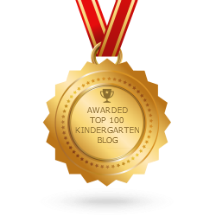Over the past two months, we have been working hard everyday to improve upon our pre-reading skills. For some children, reading comes very easily, and for others, it's more of a challenge. There are a few crucial skills that students must have in order to prepare them to be successful readers, and that's what we are focusing on in Kindergarten. When students leave Kindergarten, they should be able to do the following things:
1. Letters/Sounds/Words
- Children should be able to identify the difference between a letter, sound, and a word. Letters make sounds. Letters come together to make words, meaning sounds pushed together make words. Children should know the letters of the alphabet, uppercase and lowercase, and know the sounds that the letters make.
2. Syllables
- Children should understand that each word has syllables, and they can tell you how many syllables or "beats" are in a word. They can do this by clapping it out, or doing it in their head. They understand that syllables are different than the individual sounds in a word (i.e., the word 'dog' has one syllable, but 3 sounds).
3. Rhyming
- Children can identify words that rhyme, meaning words that sounds the same in the middle and the end. They can tell you if words rhyme when you ask them, and they can generate rhyming words on their own.
4. Beginning Sounds
- Children can tell you what the beginning sound in a word is. In our class, we say, "What is the first sound you hear come out of my mouth?". They can tell you what letter makes that sound.
5. Ending Sounds
- Children can tell you what the ending sound in a word is. In our class, we say, "What is the last sound you hear come out of my mouth?". They can tell you what letter makes that sound.
6. Blending
- Children can hear what word you are making when you slowly say a word. Eventually, they can blend out a word on their own (i.e., seeing the word "hat", making each sound, and hearing what word it is).
7. Segmenting
- This is a very difficult skill for children to acquire, and it requires a lot of work. Segmenting is being able to hear the individual sounds in a word. For example, when you say the word "me", it has two sounds: /mmmmm/ and /e/. The word "farm" has 3 sounds: /fffff/ /ar/ /mmmmm/. This is a powerful skill to have, especially when it comes to writing. Sometimes, students get confused and tell you the letters instead, because they may know how to spell it (i.e., in the word 'my', they said /mmm/ /y/, instead of /mmmm/ /i/.
8. Experimental Writing
- Children can spell basic CVC words (consonant, vowel, consonant). They have the understanding of letters and the sounds they make, they can hear the beginning, middle and ending sounds, and they can segment the word. All the skills come wrapped up in this major skill! When you ask your child to spell simple words, even "nonsense" words like "lug", "zop", or "geb", they can write the corresponding letters.
This is a brief explanation of the skills that are necessary to achieve reading success, and we are working on them everyday during our literacy lessons. There is still an importance of knowing sight words (popcorn words), as this will help when students are finally ready to read. As mentioned above, these skills are important to have before leaving year 2 of kindergarten.
There is something else that JK parents can also work on at home, as these are also important to master as we begin to learn to read!
Basic Print Concepts:
- Identify the front of the book
- Can point to where you should start reading (the words on the first page)
- Can show you with their finger which way you read (left to right)
- Can point to the words when you read to them
- Can do a "return sweep", meaning when the first line of text is done, they move to the first word in the second line
- Knows to read the left page before the right
- Knows to hold the book upright, and how to turn the pages
I hope this gives you a better idea of what you can be doing at home!












































